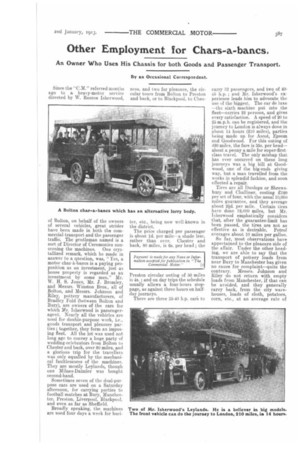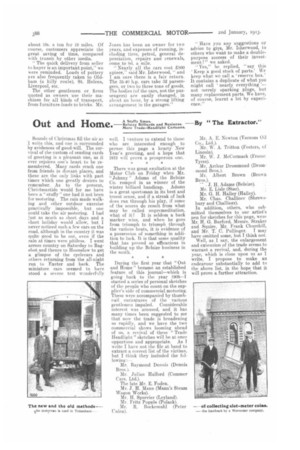Other Employment for Chars-a-bancs,
Page 11

Page 12

If you've noticed an error in this article please click here to report it so we can fix it.
An Owner Who Uses His Chassis for both Goods and Passenger Transport.
By an Occasional Correspordent.
Since the "C.M." referred months ago to a heavy-motor service directed by W. Roscoe Isherwood, of Bolton, on behalf of the owners of several vehicles, great strides have been made in both the commercial-transport and the passenger traffic. The gentleman named is a sort of Director of Ceremonies concerning the machines, One crystallized remark, which he made in answer to a question, was, " Yes, a motor char-h-bancs is a paying proposition as an investment, just as house property is regarded as an investment by some men." Mr. W. H. S. Jones, Mr. J. Bromley, and Messrs. Winston Bros., all of Bolton, and Messrs. Johnson and Riley, pottery manufacturers, of Bradley Fold (between Bolton and Bury), are owners of the cars for which Mr. Isherwood is passengeragent. Nearly all the vehicles are used for double-purpose work, i.e., goods transport and pleasure parties ; together, they form an imposing fleet. All the lot was used not long ago to convey a huge party of wedding-celebrators from Bolton to Chester and back, over 80 miles, and a glorious trip for the travellers was only equalled by the mechanical faultlessness of the machines. They are mostly Leylands, though one Milnes-Daimler was bought second-hand.
Sometimes seven of the dual-purpose cars are used on a Saturday afternoon, for carrying parties to football matches at Bury, Manchester, Preston, Liverpool, Blackpool, and even as far as Sheffield_ Broadly speaking, the machines are used four days a week for busi ness, and two for pleasure, the circular tours from Bolton to Preston and back, or to Blackpool, to Che13 ter, etc., being now well-known in the district.
The price charged per passenger is about id. per mile--a shade less, rather than over. Chester and back, 80 miles, is 6s. per head ; the Preston circular outing of 50 miles is 4s. ; and on day trips the schedule usually allows a four-hours stoppage, as against three hours on halfday journeys. There are three 33-40 h.p. car s to carry 32 passengers, and two of 4045 h.p. ; and Mr. Isherwood's experience leads him to advocate the use of the biggest. The car do luxe —the sixth machine put into the fleet—carries 22 persons, and gives every satisfaction. A speed of 20 to 23 m.p.h. can be registered, and the journey to London is always done in about 14 hours (210 miles), parties being made up for Ascot, Epsom and Goodwood. For this outing of 420 miles, the fare is 35s. per head— about a penny a mile for super-firstclass travel. The only mishap that has ever occurred on these long journeys was a big hill at Goodwood, one of the big-ends giving way, but a man travelled from the works in splendid fashion, and soon effected a repair.
Tires are all Dunlops or Shrewsbury and Challiner, costing 2120 per set of four, with the usual 10,000 miles guarantee, and they average about 20. per mile. Certain tires have done 12,000 miles, but Mr. l!,herwood emphatically considers that, after the guarantee-limit has been passed, the tires are not as effective as is desirable. Petrol averages about 10 miles per gallon. So far, most observations have appertained to the pleasure side of the affair. Under the other heading, we are able to say that the transport of pottery loads from near Bury to Manchester has given no cause for complaint—quite the contrary. Messrs. Johnson and Riley do not return with empty loads from Manchester, if that can be avoided, and they generally carry back, from the city warehouses, loads of cloth, potatoes, corn, etc., at an average rate of about 10s. a ton for 10 miles. Of course, customers appreciate the great saving of time, compared with transit by other media.
" The quick delivery from seller to buyer is an important point," we were reminded. Loads of pottery are also frequently taken to Oldham (a hilly route), St. Helens, Liverpool, etc. The other gentlemen or firms quoted as owners use their machines for all kinds of transport., from furniture-loads to bricks. Mr. Jones has been an owner for two years, and expenses of running, including tires, petrol, general depreciation, repairs and renewals, come to ad. a mile.
"Nearly all the cars cost £800 apiece," said Mr. Isherwood, "and I am sure there is a fair return. The 35-40 hp, cars take 32 passengers, or two to three tons of goods. The bodies (of the cars, not the passengers) are easily changed,, in about an hour, by a strong lifting rrangement in the garages."
Have you any suggestions or advice to giye, Mr. Isherwood, to others who want to make a doublepurpose success of their investment ? " we asked.
" Yes," he replied, " say this 'Keep a good stock of parts.' We keep what we call a reserve box.' It contains a duplicate of what you might call nearly everything '— not merely sparking plugs, but many replacement parts. We have, of course, learnt a lot by experience."






















